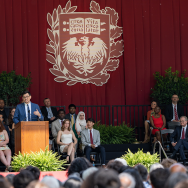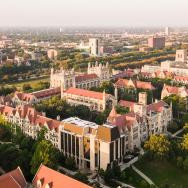As the June sun beamed, Prof. Tom Ginsburg asked the University of Chicago’s Class of 2023 to recall someone with whom they’d had a deep conversation. Reflecting on the power of dialog made him less anxious about ChatGPT, the A.I. bot which had generated the first—and quickly abandoned—draft of his Convocation remarks.
“A machine can mimic conversation; it can beat us at chess or beat us at Go,” said the renowned legal scholar. “But it cannot have the genuine sense of doubt, openness, and vulnerability that leads to actual learning and creativity.”
Ginsburg reminded the graduates, family and friends gathered June 3 for UChicago’s 537th Convocation that conversation is not easy, but necessary.
“This is one reason I love the University of Chicago, and its culture of argument and friendly challenge,” said Ginsburg, the Leo Spitz Distinguished Service Professor of International Law. “At its best, we strive to be tough on ideas and kind to people; whereas much of other discourse these days is the opposite: tough on people, weak on ideas.”
President Paul Alivisatos congratulated the Class of 2023 and reminded graduates that they, like all who’ve passed through the University before them, are part of a distinct culture—one characterized by a love of ideas and commitment to rigorous thought.
“Above all,” Alivisatos said, “you have learned to listen to those with whom you disagree, even as you share your own views earnestly.”
In his remarks, Alivisatos encouraged graduates to reach across their differences and pursue new ways of thinking, to meet both known and unknown challenges ahead.
“Like many generations of UChicago graduates that came before you, yours will be the minds that shape the world,” Alivisatos said. “You will undoubtedly bring about meaningful change in both your lives and the lives of many others.”
Keep talking, keep listening
Ginsburg began his remarks by discussing democracy—a fascination that began shortly after his own graduation.
As a scholar, Ginsburg came of age in a “democratic wave” best encapsulated by the fall of the Berlin Wall in 1989. “Democracy indeed seemed to be the only game in town,” said Ginsburg, who will serve as faculty director of the University of Chicago Forum for Free Inquiry and Expression. Since then, he’s studied where constitutional democracy comes from—and how it dies.
He acknowledged that, these days, democracy is “looking a little shabby.” Less than half of the world’s population currently lives under a democratic government, he said; and in America, citizens are polarized and dissatisfied.
Nonetheless, Ginsburg remains optimistic: People are still hopeful; their voices are loud and backed up with action. He cautioned graduates not to let disappointment overwhelm hope.
“Today is the day you get to go out in the world, to implement your ideas, developed in conversation with others here. Keep talking, keep listening and stay curious.”
Students from the University’s schools and divisions were also honored in diploma ceremonies throughout the weekend.
For Alvaro Papa Silva, MBA’23, Convocation was the pinnacle of lots of hard work and support from family and friends. The Chicago Booth grad was joined by fiance Lauren, MBA’22—the two met while at UChicago—and family visiting Chicago for the first time. “It’s a great way to celebrate being done.”
Jim Royal, AB'23, and his family were grateful to be together: The College grad’s mother explained that their last graduation, for Royal’s sister, happened amid COVID restrictions. Saturday’s ceremony was a milestone they were able to fully enjoy together.
Class Day celebration
Convocation weekend began on June 2 with the Class Day ceremony, which recognizes the accomplishments of College graduates, fourth-year students Jeremy Huang, Daphne de Beistegui and Ricky Holder spoke along with New York Times opinion columnist Bret Stephens, AB’95.
“Just as important as the written words we read for class were the words we spoke to each other,” said de Beistegui, who majored in fundamentals: issues and texts. “‘Free speech’ is too often construed to mean ‘say it all’. But as the word counts on our essays have taught us, the opportunity to really say something is precious.”
In his remarks, Stephens encouraged the Class of 2023 to remember and uphold the Chicago Principles of free and open inquiry, which the late Robert J. Zimmer championed along with longtime College Dean John W. Boyer.
“Discussing and debating and interrogating and doubting and laughing and thinking harder and better than you ever did before isn’t the antithesis of fun, it’s the essence of it,” he said. “It’s the uniquely joyful experience of being authentically and expressively and unashamedly yourself and, at the same time, having a form of honest and intimate contact with others who, in their own ways, are being authentically and expressively and unashamedly themselves.”
UChicago honors
In addition to the degrees awarded to this year’s graduates, the University awarded honorary doctorates to five distinguished scholars at Convocation: Arup K. Chakraborty, a scientist and engineer at the Massachusetts Institute of Technology; James P. Comer, a child psychiatrist at the Yale School of Medicine; Hélène Esnault, a mathematician at the Freie Universität Berlin; Callum Roberts, a scholar of marine conservation at the University of Exeter; and James A. Wells, a pharmaceutical scientist at the University of California, San Francisco.
The University also honored Joseph Neubauer, the former chair of the Board of Trustees; and Zimmer, the former chancellor and UChicago president. The announcement of Zimmer’s honor drew a long, standing ovation from those onstage and in the audience.
The University also recognized the faculty winners of this year’s Llewellyn John and Harriet Manchester Quantrell Awards for Excellence in Undergraduate Teaching—believed to be the nation’s oldest prize for undergraduate teaching—and the Faculty Awards for Excellence in Graduate Teaching and Mentoring.

